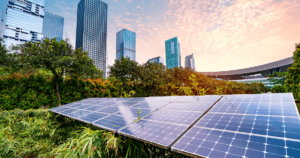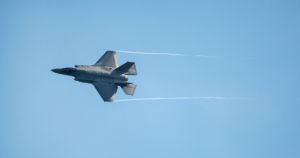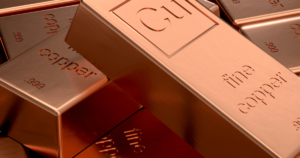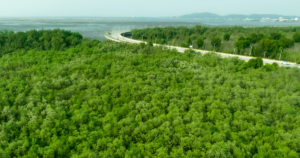- Chrome sorting process separates the waste at the beginning of the process to reduce water, energy and chemical use later in the process.
- TOMRA’s process uses half the energy of competing processes.
- Chrome spot price may increase based on demand out of China, who is now out of lockdown.
- Links waste reduction to profits giving mining companies incentive to run cleaner operations.
- All parts and services required for running machine are available locally in South Africa, reducing downtime.
Helga van Lochem is a Sales Manager for TOMRA covering sensor based sorting for mining in South Africa. She is an expert in applying sensor based sorting solutions to mining applications and has a rich background in both marketing and project management in the mining and engineering fields.
Lara Smith sat down with her for a candid discussion on the 9th April, diving into the ways that TOMRA’s sensor sorting technology can solve many problems faced in the industry today. In South Africa, especially coming out of this difficult lockdown period, those challenges include energy and water conservation and waste management. The following is a transcript of the video:
Lara Smith: Hi, I’m Lara Smith. You’re joining me from my couch in Israel under lockdown. I’m here with Helga van Lochem, who’s from TOMRA in South Africa. Good morning, Helga. How are you?
Helga van Lochem: Fine, thank you.
Lara Smith: What’s happening in SA?
Helga van Lochem: Well, SA is on a 21 day lockdown. So we, or, I am picking up my pace and I’m speaking to people more than I probably ever have.
It’s just a whole new kind of technology, so we got to keep it going. We’ve got to keep positive. We’ve got to hope that it ends in 10 days time, and then hopefully it’s business as usual. Otherwise we’re going to all go nuts here.
Lara Smith: Right. And so business as usual, Tomra is a German company and you’ve now got offices in Johannesburg.
Helga van Lochem: Yeah, so we Norwegian based listed company, 1 billion euro a year, so we are a big player. Uh, mining’s only 5%, 10% of our business, but we have been up and running very successfully in South Africa for a good 10 years now. We’re very big on diamonds. I mean, most diamond plants don’t even start these days without a Tomra machine. So the best is diamonds, but it’s the other commodities that I am responsible for. My colleague, Jeffrey, does the diamonds based from Germany. That’s our head office. But in South Africa, I do all the other commodities and such.
Lara Smith: Right. And you’re working on Chrome primarily right now, right?
Helga van Lochem: Yes. So lucky me, or whatever, we kind of saw chrome as a bit of an obvious one, purely because [the visual], the eye can see the difference between chromite and ferro axinite, and in terms of sensor-based sorting, we could separate it. So if you can kind of separate it with your eye, we pretty much have the technology to separate it mechanically, so that’s the idea. We happen to be using XRT x-ray technology for that particular commodity, and we do nicely, we’ve got a couple of machines up and running now in the Eastern Chrome Lum and it’s working nicely, we’re getting good results. The guys are 40% Chrome, small to 8% in waste. So yes, it’s nice. We’re all excited. We think it’s the beginning of a long term roll out, we think there’s nothing stopping us to do all the chrome businesses in South Africa considering in theory I hear we’ve got about 80% of the world’s Chrome. Yes, LG 6 the nicest. But as you go from LG 6 to ng to UG, we just have to be a little bit careful, but it can be done, you know, so we’ve proved that absolutely, categorically that x-ray is the answer, you know, if it’s no water, I know DMS has got its place in terms of spirals, but in terms of rock technology, we deal with rocks, not powder. We can see it. You know the machine is, it’s smart. It sees it, it knows the difference between chrome, it knows the difference between ferro axinite…
Lara Smith: So Tomra is very involved in sorting the ore so that you don’t have to mine everything, and that reduces the cost effectively.
Helga van Lochem: So the plan of action, I know the new technology, the new words, everybody uses is selective mining. So in a way we like kind of counteracting it. So instead of selecting just the Chrome seam very specifically, you kind of allowed to with Tomra, to just “bliksem” the whole lot, kind of thing. You can take a whole lot and the Tomra machine will sort it up front, in theory, it’ll increase the throughput and you don’t have to be so specific. And then the beauty of it all is obviously to be getting rid of the waste upfront way before you start putting chemicals and water. It’s a completely dry process, which is a big thing these days in Africa. It’s completely dry. And the idea is that the plant, the footprint of the plant, should be half. That’s the idea. So we get rid of half the rubbish upfront, and then you don’t spend all your money processing waste. So we’re in the waste business, actually, I mean it sounds all… but we in the waste business, that is really our game. You’re trying to get rid of the rubbish upfront so you don’t spend the money on massive bull mills and massive systems, which is a little bit silly.
Lara Smith: It’s very interesting that this lockdown in one way could end up, very positive for South Africa’s chrome mines. I was speaking to one of the traders yesterday and he was saying, if we just do the maths, China, which is now up and running, is running down their inventory, and there’s no chrome to replace that inventory right now, especially if South Africa extends that lockdown period. And, so what we’ll then see is the spot price increase; that was a lot of a panic buying, so we’ve seen the spot price increasing and the question is whether that will be sustainable. But what we’ll find then is that companies will look to reduce costs any way they can once they are up and running, and so it sounds like Tomra, taking that always up front, and I presume it’s not so energy intensive either, which is a big concern for South Africa.
Helga van Lochem: Yeah, we’re doing some comparisons as we speak, but in principle, from what I’m seeing now, it’s half the energy, I mean, really for those old drum DMS’s, you know, we replaced one now on the EasternLum, and they were talking 400, 500 kilowatts compared to our 200. So it’s half the energy, you know, at the moment it’s still to be confirmed, but it’s pretty much half the energy and we know Eskom is pulling back, we know there’s no water and people, as much as it might be considered an expensive piece of equipment, I think people buy when they’re in trouble. I mean, I know that’s disrespectful, but people only buy when there’s something awkward, it’s uncomfortable, we’ve got to get better, smarter, quicker, sharper. Whatever that is, you know? And maybe that’s the incentive. It sounds a bit ruthless, but that’s what business is about, you know, we only really fix and change and look at new stuff when we burning; when there’s a problem. And that’s kind of good for us. I know it sounds a bit ruthless there, but, but it’s good for us because people no longer have those resources available, we don’t have access to all this mass of water. We don’t have access to this huge electricity. You know our electricity’s expensive. We know, and as you say most of the stuff I think is going to China. I think it still was up until two weeks ago, the Gates were open. But as you say, now the Gates are closing from this side. But I suppose the minute we open it and hoping its next week, they lift a little bit of the mining, you know, at least say we got a mine, I mean, it’s a commodity, it keeps our GDP going. Got to mine in some way. I don’t want people sitting on top of each other, I agree. But you know our machine, it’s got one operator. We’re not sitting on top of each other. You feed it in, it goes through a little black box and there’s your products and there’s your waste.
I don’t see, you know, I’m hoping the Corona doesn’t stop that kind of process. It’s not very human intensive and that’s the whole point of automating these days. That’s the thing, and I know it sounds horrible again to get rid of the human so the human element is not controlling it and therefore you could almost stand back and let it run itself.
I suppose that’s what we do.
Lara Smith: But the trend is towards automation and towards modern mining methods. So Tomra then plays right into that, and maybe just before we go, so Tomra has expanded into South Africa recently and in a big way. And I was in your offices in Johannesburg, and you’ve got a lot of capacity there and it looks like you’re growing.
You’re in South Africa, there’s been a lot of negative publicity around South Africa, ironically, Coronavirus has brought one positive news to South Africa in terms of the way we are handling it. Where do you see, South Africa, what do you see as the outlook?
Helga van Lochem: Well, you know, most people are a bit nervous about a European technology, “oh dear, the spares”, and “oh dear every time I need something, we’ve got to speak to Germany and…” You know, So that is now over. So we keep all the spares here, in Longmeadow, we’ve got big offices, as you saw, and we will have a test facility soon on the floor. We’ve ordered the machine, it’s still on the ship, and we will be able to show people, so it’s training, so you’re able to train people. You know, that is a big thing in South Africa. Yes. We very heavy on our service level agreements because people are a little bit, “ooh, it’s a black box and ooh, it’s a computer.” Well so is this a computer [picks up phone], but nevermind. So I think it gives people confidence that they’re not this isolated place, the end of this huge continent and the Europeans are doing what they are doing and there’s no connection. So I think it’s a very nice connection between us and the European office and we are very able to fix the machines ourselves. We have all the spares here in South Africa. We are here to stay. Tomra is investing in South Africa and shows you investing as opposed to a lot of the European companies are pulling out because they’re all nervous. Tomra sees opportunity in Africa. Tomra sees there’s lots of opportunity here, it’s a massive continent, there’s lots of resources here. In theory, we’re all about resource revolution and saving the planet, I know that’s a bit warm and fuzzy. It’s almost contradictory to mining.
But that’s the background, you know, we in reverse vending machines overseas and recycling. So I think somehow we’ve linked waste to profits. And that sounds a bit weird again, but we’ve done that in Europe. So we’ve done that in America. We’ve done that in Australia. We might be a little bit behind here in South Africa, but we in the business of trying to get rid of waste.
We use waste, lets not abuse the resources we’ve got here in South Africa, and that’s the kind of intention, which is nice, I think. Yeah, it’s got a nice feel to it. Yeah.
Lara Smith: Thank you very much, Helga, thank you so much for your time and best of luck in lockdown and yes we do hope we restart next week or the week after.
Helga van Lochem: For sure. I need to go and pick up rocks. I need to go to mines. I need to go and see visual stuff. The sitting in home, it’s okay for now, but it’s enough.
If you would like more information about TOMRA, please leave your details below and we will contact you.
[gravityform id=”16″ title=”false” description=”false”]





